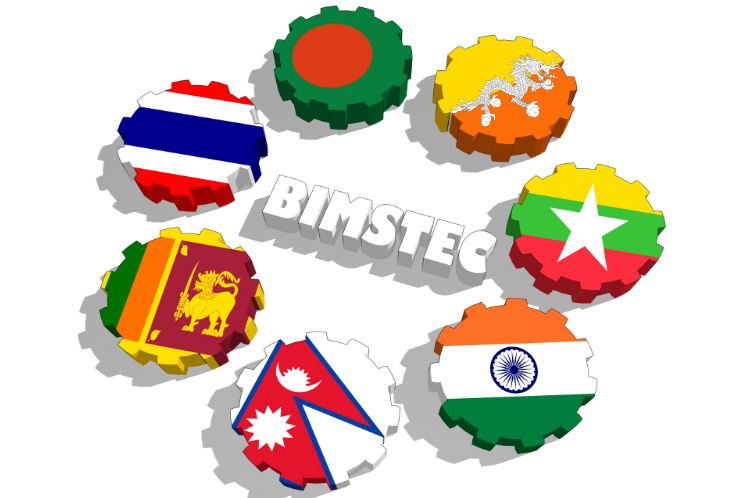
The invitation to the leaders of the member-states of Bay of Bengal Initiative for Multi-Sectoral Technical and Economic Cooperation (BIMSTEC) for the swearing-in ceremony of Narendra Modi in New Delhi signals the intent of the current political dispensation to accord importance to this regional grouping.
BIMSTEC comprises of seven member states adjacent to the Bay of Bengal. Member states include Bangladesh, Bhutan, India, Myanmar, Nepal, Sri Lanka, and Thailand. The countries are significant for India for several reasons such as BIMSTEC will bolster India’s efforts to increase cooperation with its neighbors as envisaged under the “Neighbourhood First Policy” and “Act East Policy.” Further, Narendra Modi’s government has pointed out that leveraging BIMSTEC will promote cooperation among regions. BIMSTEC member-states overlap the regions identified as significant for India under its Act East Policy goals. Hence, BIMSTEC is one of the key platforms for India to pursue its larger economic and strategic goals with countries on its eastern flank. Increased cooperation among BIMSTEC would also augment Thailand’s “Look West Policy.” Smaller members of the group would benefit from greater market access in India and Thailand.
BIMSTEC is also sought to be promoted as a subset of the Indo-Pacific, thereby emphasizing the group’s relevance for enhancing sea-based connectivity as envisaged by the larger group of nations who ascribe to the Indo-pacific concept. India is also keen to promote the “blue economy,” which pertains to the common economic aspect of the member countries of the group.
India’s emphasis on the BIMSTEC is a strategic maneuver to embark on cooperative endeavors in the neighborhood by bypassing SAARC, members of which were invited to the swearing-in ceremony in 2014, which often held hostage to the bilateral issues between India and Pakistan. Despite starting on a positive note, India’s relationship with Pakistan was riddled with tension during the Narendra Modi’s government from 2014-2019. For instance, the meeting between Kashmiri separatists and Pakistani High Commission in 2014 led to the cancellation of foreign secretary talks by India. India canceled the talks due to Pakistan’s inaction towards groups such as Jaish-e-Mohammed (JeM) which was responsible for attacks in Pathankot, Uri, and Pulwama. India was also irked with Pakistan’s obstinance to regional connectivity projects among SAARC nations. Pakistan fears that the regional connectivity may flood Pakistan’s markets with Indian goods and will also develop a route for direct trade between Afghanistan and India. Such incidents and events propelled India to find collaborative alternatives in the region such as the BIMSTEC which excluded Pakistan to fostered regional cooperation.
The current Indian government seeks to promote connectivity and security within BIMSTEC nations as both are instrumental in augmenting development in the country, especially Northeast India. Connectivity, along with other issues such as coastal shipping, motor vehicle agreement, electricity grid, energy cooperation, ICT among others have been the mainstay of the BIMSTEC. The current government in India is keen to promote the security aspect of the group. Regarding security, India is working closely with Myanmar. Earlier this year, the Tatmadaw (Myanmar’s army) mounted military operations against the NSCS in East Sagaing as well as against the PLA-UNLF and ULFA outfits which have taken shelter in Myanmar. India also prevented rebel groups from Arakan from entering Mizoram during the operations carried out by the Tatmadaw. These activities were a result of India’s supply of logistical inputs, arms, information as well as India’s insistence on flushing out insurgent groups ensconced in Myanmar’s soil.
India’s increased interest in invigorating its relationship with the BIMSTEC has led to increased Chinese presence in India’s backyard. Due to the Belt and Road initiative, China has increased its presence in the region. Because of the white elephant projects such as the port in Hambantota, Sri Lanka has handed its operation to China which has led to trepidation in India given the strategic location of the port and possible military use of the port by China. India concerns that Chinese investment in the Kyaukpyu port in Myanmar may lead to another handing over of strategic assets to China over debt issues, which will further bolster Chinese presence in the waters around India. India’s interest in shoring up relations on economic, connectivity, and security aspects could be the efforts to offset current and probable Chinese presence in the future.
Current Modi Governments’ insistence on propelling BIMSTEC as one of the foremost regional platforms to encourage conducive relations between member countries will find fruition only if certain logistical handicaps are overcome pertaining to its lack of staff, underwhelming resource capital, absence of a charter and permanent working committee and the lack of regular meetings.
*** Dr. Obja Borah Hazarika, is currently teaching as an Assistant Professor in Dibrugarh University, Assam since 2013. Her research interests include international relations and riparian relations. ***
![]()

